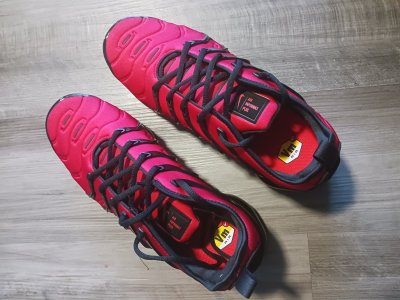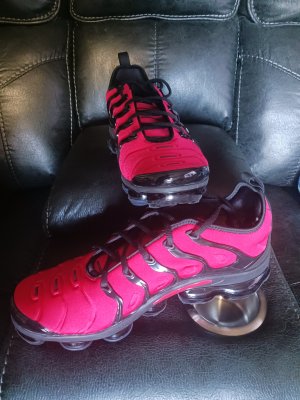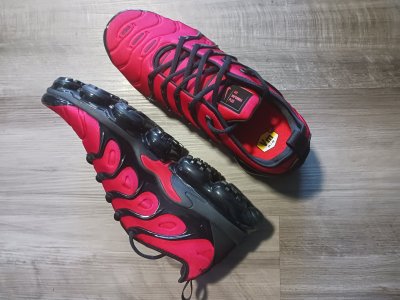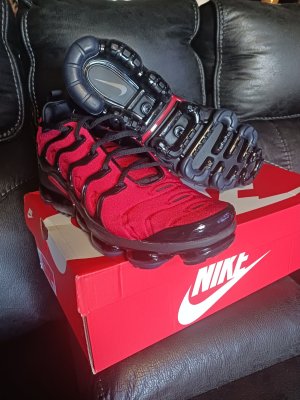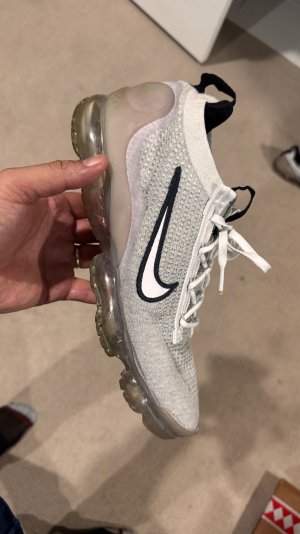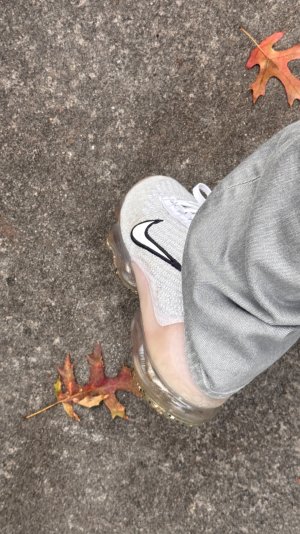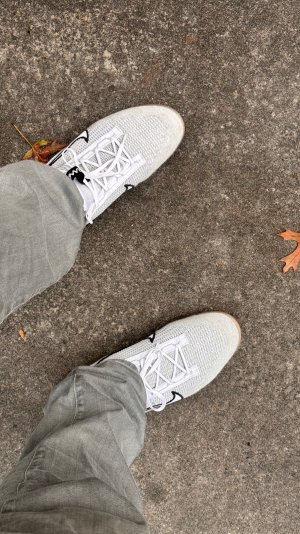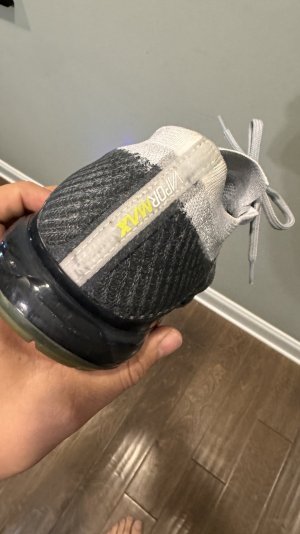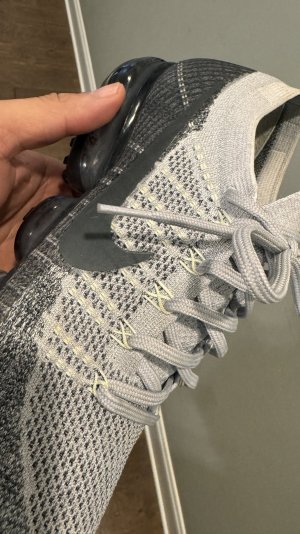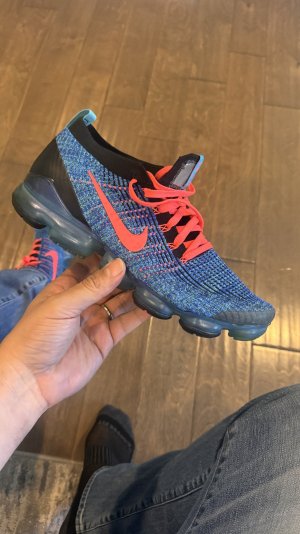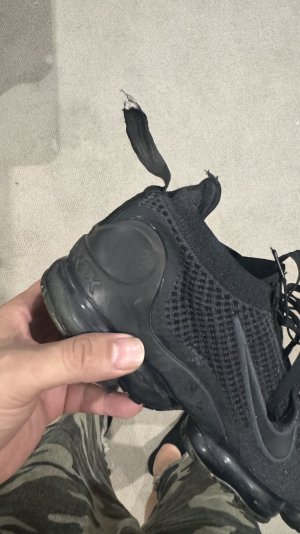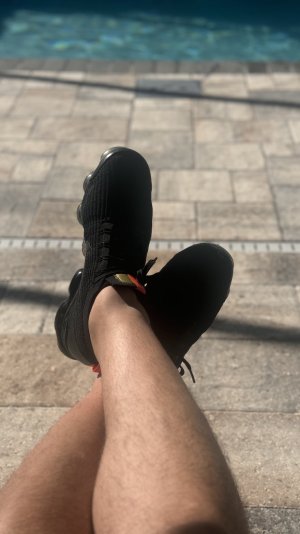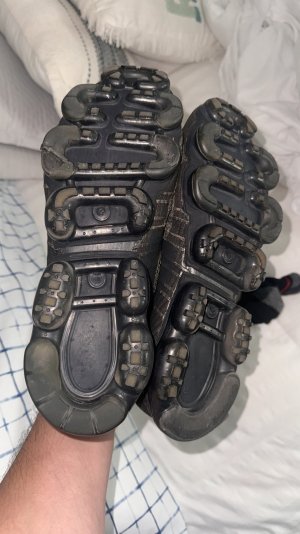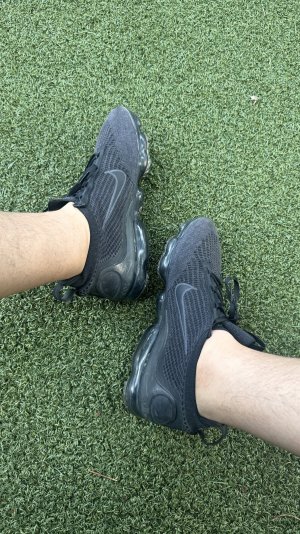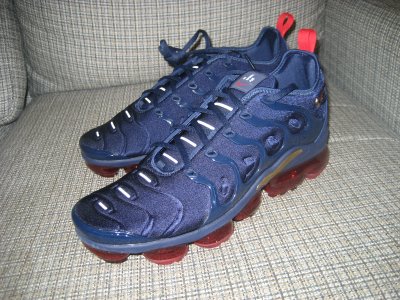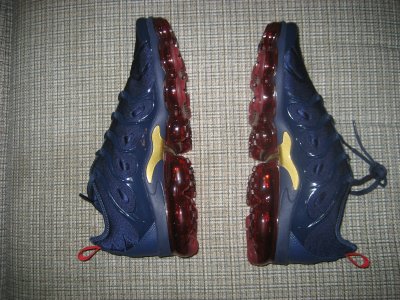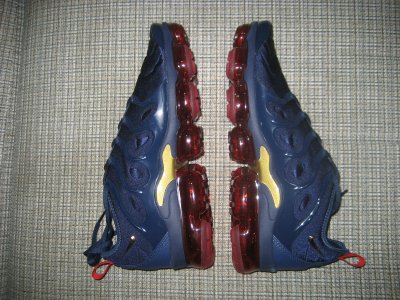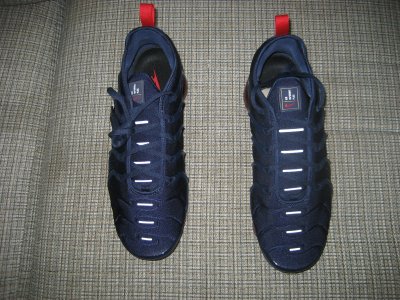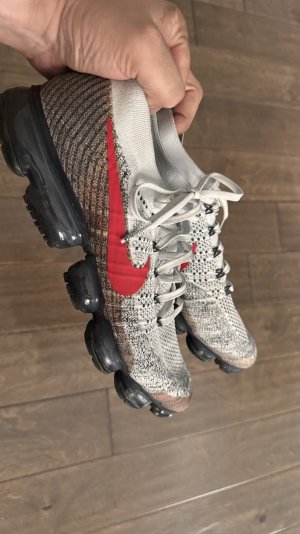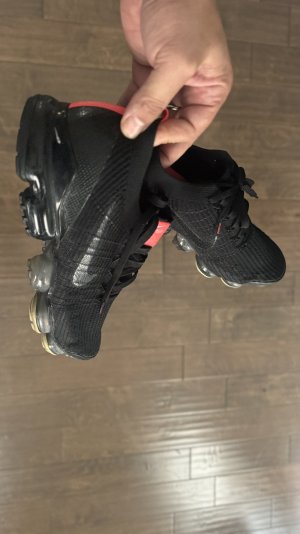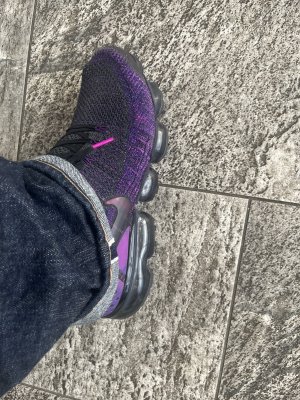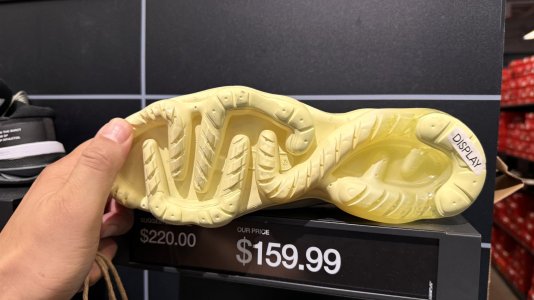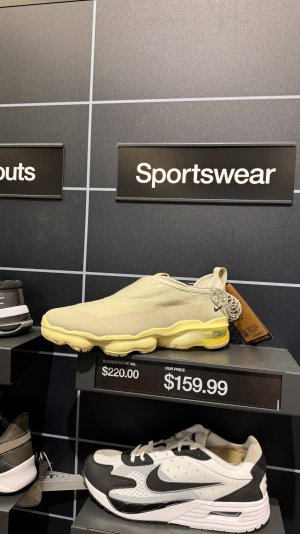So what's it like to run in the VaporMax?
Well, let's kick back and get into this review to find out!
LONG REVIEW ALERT, SO READ THIS PART FIRST. If I made typos or if there's any bad grammar, ignore it. I'm not trying to get a grade like it's a paper.
FOR PEOPLE WHO DO NOT WANT TO READ: Read summary statement, look at pictures and captions, read colored italicized parts, and read "OVERALL THOUGHTS."
FOR PEOPLE WHO WILL READ EVERYTHING: Read everything.
Each section will have an italicized opening statement to let you know
what is a positive, [COLOR=#red]
what is a negative[/COLOR], and
what's in the middle (just OK). A Q&A section is provided in case of anything at the very end!
ONE-SENTENCE SUMMARY STATEMENT
Although it may not be worth placing very high near the top of the list of running performance footwear options, the next generation of visible Air makes a strong innovative and necessary improvement by exceeding expectations thanks to its balanced bouncy, and responsive cushioning as it legitimately bounces its way back into the running category while allowing us to know what running on Air feels like.
------------------------
First, let's get the initial details on what to know about my running details and what shoes we are expecting to read for comparisons.
Size & width: 8.5 D (normal width)
Striking point: heel & midfoot
Gait (motion of stride): neutral
Running shoe comparisons: Zoom Pegasus 31 & 32 (Shield & Mesh), Zoom Vomero 11, Air Max 2013, LunarEpic Flyknit, LunarEclipse 2
Miles logged in thus far: 28.6 (44+ combined total running and walking mileage)
SIZING & FITTING
For my normal width, it runs true to size.* It's snug in the beginning, but with the skirt of the Flyknit toebox being able to stretch, running in them or just even wearing and walking in them for a good few hours or so will help stretch the toebox out just about enough to give you that nice fit. The midfoot ran normal for me, but from what I've read, it can be a bit snug as well. Give it some time, and it'll stretch out as well. There are stretch zones on that shoe that you can definitely work with. The best comparison as many people have made is the Flyknit Racer, and the only difference is the stretching capability (a big plus for Flyknit). I wear a size 9 in the Flyknit Racer, because no parts, especially the toebox, of the Flyknit stretch, especially . I wear an 8.5 in the Air VaporMax, because the toebox and the upper part of the midfoot and the mini-ankle collar can stretch.
*For wide-footers or anyone with flat feet, it may be best to go 1/2 size up to accommodate the width.
TRACTION & DURABILITY
The traction is great, and the durability issue is practically nonexistent, contrary to initial judgmental beliefs. I know; one of the most polarizing parts of the shoe is the traction choice and durability skepticism. You can wipe your doubts away. Simply put, the exposed Air units have no rubber traction compared to the traditional running shoe, or any shoe, really, and it's replaced with TPU lugs that stick out like teeth assisted with rubber pods on high-wear areas. I've hit the road in these on flat surfaces, dirt and sand surfaces, and the scary embedded river rock surface commonly known on the Great Highway path, and it all worked perfectly fine!
Various surfaces shown above like wet flat surfaces to embedded river rock surfaces to sand/dirt paths makes no scratches to the Air units and its TPU lugs. Click the links to get an aerial view of each surface.
I've stepped on a big tree bark, and that didn't pop the Air units. I've had two pieces of rock lodged between an Air unit (once each), and the Air units did not pop or scuff. One of them, I didn't even know until 10-11 hours later when I took my shoes off, and got ready to work. I came home to grab the VaporMaxes I left behind my front gate of the house and found out around then. Check out the picture provided right underneath.
Worry-free Air units made sure it takes no **** from anything with jagged edges.
The TPU lugs have not shaved a millimeter off the units yet, and that tells you how durable it is. The reinforced high-wear rubber traction sections on the sides of the forefoot and the one in the heel makes a big difference in protecting the units where I didn't slip at all in any direction: flat, uphill, and downhill.
MATERIAL SUPPORT
As a neutral runner, the seemingly-updated Flyknit upper continues to get better with stretch zones in the ankle, tongue/midfoot, and the skirt of the toebox. The reinforced Fuse material around the toebox, midfoot, and heel helps keep my feet locked in and feel very comfortable!** This likely refers back to the Sizing and Fitting section, but I love the minimalist feel to it. The lack of thicker materials makes a big difference for me, because my feet feels free. I can never run in a Flyknit Racer since the cushioning system works against my favor. I've ran in the Zoom All Out Flyknit where although the Flyknit was great, the raised toebox didn't lock the forefoot in that well. The attached tongue feels better and is personally a much better option compared to the ankle collar option. The ankle collar options are fine, but I'd like my ankles to be free of anything. Attaching the tongue removes the constant tongue-sliding issue that happens among many other shoes. I also deal with lace pressure sometimes, and it's not a fun feeling to have when you're on a run. It's a *****, 'cause it just stops you and your momentum. Since the upper's so minimal, it's actually a good and bad case. It's bad, because it's easier to tie your shoes too tight when you run, but it's good since you know and have a better feeling of it without all the extra padding in the way. The Flywire continues to do what it's always been doing as tightening it locks the feet in well as usual. The one that leads to the heel is a good ergonomic design for lockdown.
This is all a great and surprising positive for me since I primarily ran in the Zoom Vomero 11s, and Zoom Pegasus 31s and 32s (Shield and regular mesh versions). I'm always used to structural support, but running on road surfaces with a Flyknit upper was surprisingly not a problem at all.
**See "GAIT & STRIDE SUPPORT" section.
GAIT & STRIDE SUPPORT (IMPORTANT FOR THOSE WHO ARE NOT NEUTRAL RUNNERS)
[COLOR=#red]IF YOU'RE NOT A NEUTRAL RUNNER and you have a minor supination (outward roll when landing), you MAY have some problems and may need to look elsewhere for a running shoe. If you're not a neutral runner and you pronate (inward roll when landing), you WILL have a big problem.[/COLOR] One of the major things done to the shoe is the removal of a midsole, and rubber housing that always takes care of the cushioning system while forming a traction pattern and support molding. It's like removing an outrigger for basketball shoes and replacing it with nothing. While most people believe that the Air VaporMax does not have any stability support, it actually has just about a bare minimal amount compared to the Zoom All Out Flyknits, and here is why. The cushioning of the Air VaporMax are all filled up within its TPU units, and the midfoot units just have a little bit of that edging support on the lateral side to provide JUST a little bit (
From 1 to Another: The Nike Air Max and the Nike Air VaporMax.
This section is not part of the performance review, but this is more of a discussion about Nike Air. In 1979, Nike Air was introduced in the Tailwind, but before it was made, the concept was brought upon to Phil Knight at that time just as a standalone unit. "Running on Air" wasn't exactly a doable option as it created lots of instability, so it had to be housed. Tinker Hatfield, inspired by the Pompidou Center in Paris, exposed what Air is. That Air unit was revolutionary, and it made people wonder why it's exposed, and how different it is that it's became a staple of many of our lives. No matter where you go now, you see that bubble, Nike or not. That was the trend that the Nike Air Max created in 1987.
The Nike Air VaporMax is, in a way, doing the same thing. "That bubble looks so weird." "I can't **** with that bubble; it looks like it'll pop." That's exactly what they want you to think. Not only is the VaporMax creating that type of chatter, it is doing what couldn't be done in 1979: run directly on Air. If Nike is doing this right, they are building a new generation with the same DNA that was created in 1987, and rightfully so, it should continue. I personally hope that the future of Nike Air continues to stay bright!
Ninja running pants alert.
---------------------
QUESTIONS & ANSWERS
Q: Nike Air VaporMax vs. adidas Ultra Boost?
A: Honestly, I'm annoyed as **** of this question. The Air VaporMax is a bouncy, firm, and responsive pair of shoes. The Ultra Boost is a soft and responsive pair of shoes. What's my answer? Buy what you like, and quit the ******* dogging-style comparison. Respect what every brand has to offer, and enjoy it.
Q: You made comparisons to Zoom Air during the review. Would you say this is possibly a replacement of Zoom Air?
A: I wouldn't say it is, because Zoom Air can still be pocketed into a shoe while the VaporMax is a sole itself. However, if they find a way to pocket these Air units to respond like a Zoom Air unit, then there could be a chance Zoom Air may fade. I love my Zoom Air though, so I'll need that around!
Q: Were you afraid of the Air units popping?
A: I honestly wasn't. I was confident it'd be fine; otherwise, this product wouldn't be available to the public right now.
Q: Will you run in other colorways/pairs?
A: It's an aesthetically pleasing shoe, so there might be a chance I would choose to pull off a run in another colorway.
Q: Did you try these out on a treadmill?
A: I did not. I am personally not a fan of treadmills, and I love getting fresh air outdoors and I need all the factors to put in as much as possible.
Q: Will you be comparing the Air VaporMax to ZoomX cushioning?
A: YES, so this will be a big one. I definitely have plans to check out this summer's releases of the Zoom VaporFly/Zoom Fly. I am a huge fan of Zoom Air, so for Nike to incorporate Zoom in a FOAM instead of an Air unit, it will be very interesting. For the Boost enthusiasts, if you want to make a comparison, the ZoomX midsole is the one you guys should have your eyes on.
Q: How are the shoes holding up after getting some miles in?
A: The final pictures here can show you how it's looking... practically just like new.
I had to double up just in case...



















